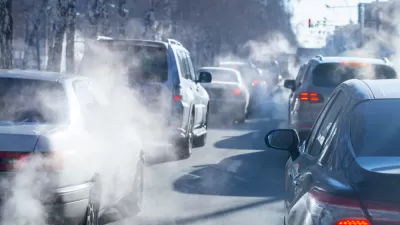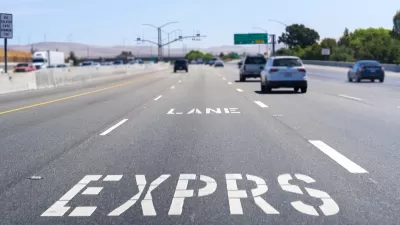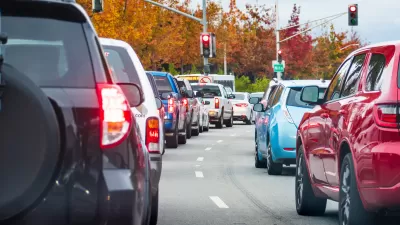As the holiday travel season begins, Becky Krystal reminisces on rest stops encountered along family road trips and observes that "stops are evolving from small, flypaper-plastered restrooms into airy, high-tech travel plazas and welcome centers."
On Interstate 25 south of Cheyenne, Wyoming, a $16 million welcome center consists of exhibits representing the state including a re-creation of a dinosaur dig site and a replica of Butch Cassidy's jail cell. "The Wyoming welcome center and other 21st century highway rest stops have come a long way since their rustic predecessors," writes Krystal. The first facility apparently came to existence in the late 1920s when an engineer built picnic tables to give families a safe place to stop and rest, and the picnic areas evolved into the roadside parks of the 1940's and '50s to the utilitarian structures of the 1960's and '70s. Many of those structures are now worn down, and public-private partnerships are working on rebuilding them. For example, the 48-year-old Maryland House and the nearby 36-year-old Chesapeake House in Maryland will be torn down and reopened with gas stations and food vendors.
"The right to offer such commercial outlets is the exception rather than the rule," says Krystal. From the early years of the interstate system, the Federal Highway Administration enforced a commercial ban "to prevent monopolies for services and to ensure that travelers didn't feel pressured to buy things." However, rest stops that don't offer commercial services have pursued other options like enhanced vending machines and information kiosks in Virginia, farmers markets on the Pennsylvania Turnpike, themed centers in Texas and Missouri, and free WiFi in Maryland, Iowa and North Dakota. Many of these new facilities are also eco-friendly with LEED-certification and a geothermal pump system in Virginia; solar panels in California, Wyoming, and Oregon; wind turbines in Missouri; and green roofs at rest stops throughout the country.
"The new generation of features and amenities can sound too good to be true, given the economic difficulties many states have encountered over the past few years," admits Krystal. States have reduced service at or even shut down rest areas in the past few years, but "rest areas aren't on the verge of extinction - yet, anyway." Rest areas are "now an established part of American travel," said Joanna Dowling, a historian who created www.restareahistory.org, and "a very valuable commodity," said Lon Anderson, the managing director of public and government relations for AAA Mid-Atlantic who helped organize opposition to the closings.
FULL STORY: It’s not your father’s rest stop

Maui's Vacation Rental Debate Turns Ugly
Verbal attacks, misinformation campaigns and fistfights plague a high-stakes debate to convert thousands of vacation rentals into long-term housing.

Planetizen Federal Action Tracker
A weekly monitor of how Trump’s orders and actions are impacting planners and planning in America.

In Urban Planning, AI Prompting Could be the New Design Thinking
Creativity has long been key to great urban design. What if we see AI as our new creative partner?

King County Supportive Housing Program Offers Hope for Unhoused Residents
The county is taking a ‘Housing First’ approach that prioritizes getting people into housing, then offering wraparound supportive services.

Researchers Use AI to Get Clearer Picture of US Housing
Analysts are using artificial intelligence to supercharge their research by allowing them to comb through data faster. Though these AI tools can be error prone, they save time and housing researchers are optimistic about the future.

Making Shared Micromobility More Inclusive
Cities and shared mobility system operators can do more to include people with disabilities in planning and operations, per a new report.
Urban Design for Planners 1: Software Tools
This six-course series explores essential urban design concepts using open source software and equips planners with the tools they need to participate fully in the urban design process.
Planning for Universal Design
Learn the tools for implementing Universal Design in planning regulations.
planning NEXT
Appalachian Highlands Housing Partners
Mpact (founded as Rail~Volution)
City of Camden Redevelopment Agency
City of Astoria
City of Portland
City of Laramie





























